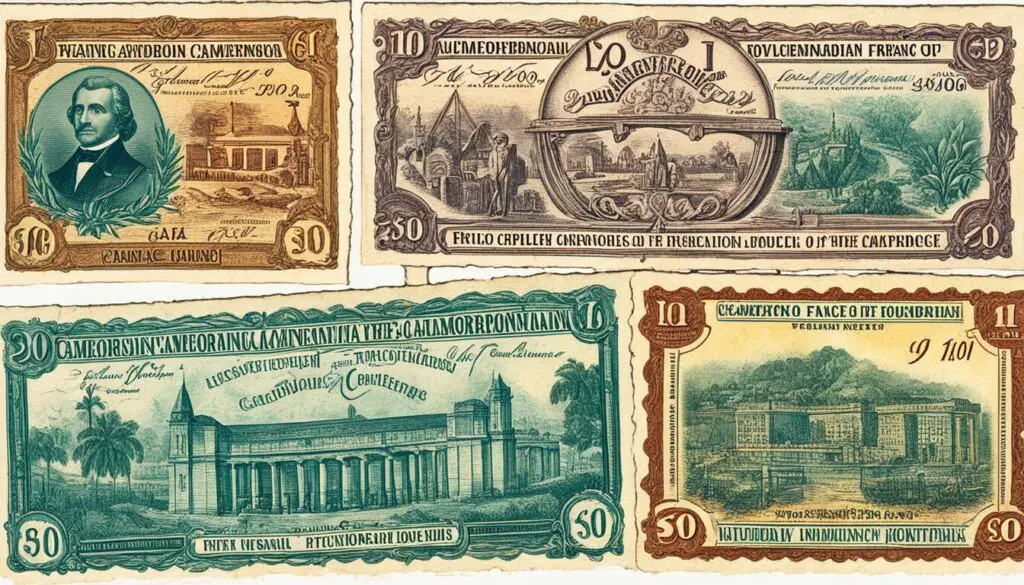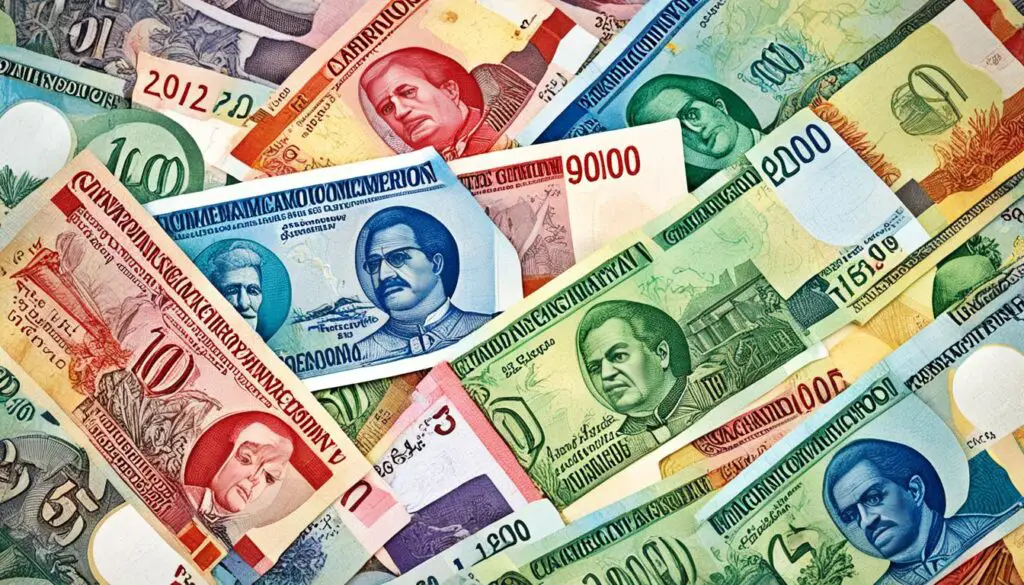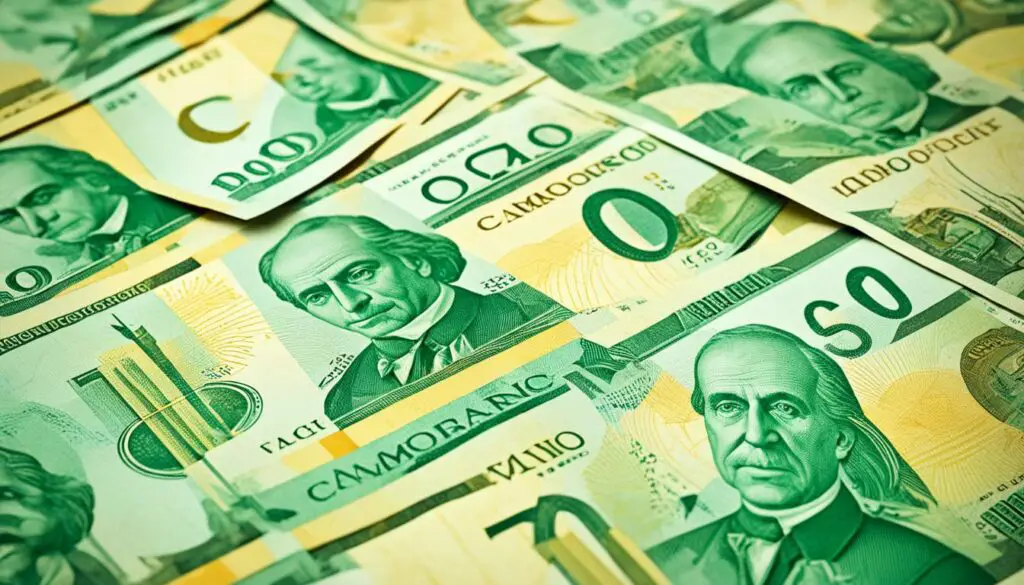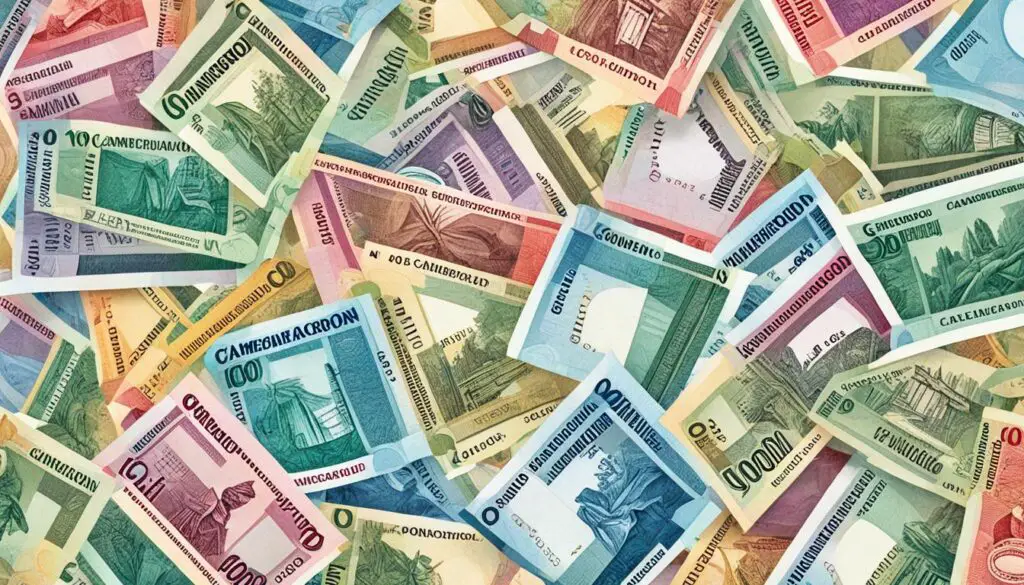Welcome to our comprehensive guide on Cameroon currency, where we will explore everything you need to know about the Cameroonian franc. Whether you’re planning a trip to Cameroon, engaging in business transactions, or simply curious about the country’s monetary system, this guide will provide you with valuable insights.
The Cameroonian franc is the official currency of Cameroon and plays a crucial role in the country’s economy. Understanding its history, value, exchange rates, and impact is essential to navigate the currency landscape effectively. Let’s dive in and discover the fascinating world of Cameroon currency.
Key Takeaways:
- The Cameroonian franc is the official currency of Cameroon.
- It plays a significant role in the country’s economy.
- Understanding the history, value, and exchange rates is important for travel, trade, and investment purposes.
- Exchange and conversion of Cameroonian francs require careful consideration.
- The Central Bank of Cameroon plays a vital role in managing the currency and ensuring stability.
Brief History of the Cameroonian Franc
To understand the current state of Cameroon currency, it’s important to grasp its historical background. This section will take you on a journey through the origins of the Cameroonian franc, tracing its evolution and the significant events that shaped its existence.

The Cameroonian franc has a rich history that dates back to the colonial era. The currency was introduced in Cameroon in 1945, during the French colonial rule. Previously, Cameroon used the Central African CFA franc, which was shared among several other Central African countries.
Following Cameroon’s independence in 1960, the country continued to use the Central African CFA franc as its official currency. However, in 1972, Cameroon withdrew from the Central African Monetary Union and introduced its own currency, the Cameroonian franc.
Since its introduction, the Cameroonian franc has undergone several devaluations due to various economic factors. These devaluations have impacted the purchasing power of the currency, leading to challenges for businesses and individuals alike.
Evolution of the Cameroonian Franc
In the early years of its existence, the Cameroonian franc had a fixed exchange rate with the French franc due to its affiliation with France. However, in 1994, following the devaluation of the CFA franc, the exchange rate of the Cameroonian franc was pegged to the euro.
Over the years, the Central Bank of Cameroon has implemented measures to maintain stability in the currency market and control inflation. These efforts have helped in managing the value of the Cameroonian franc and ensuring its acceptance in domestic and international transactions.
Today, the Cameroonian franc is widely used in Cameroon for day-to-day transactions. Despite the challenges it has faced over the years, the currency remains an integral part of the country’s economy.
The Role of the Cameroonian Franc in Cameroon’s Economy
The Cameroonian franc plays a vital role in the economy of Cameroon. As the country’s legal tender, it holds significant influence over monetary policies and impacts various sectors, including imports, exports, and foreign investments.
As the primary currency used for transactions within the country, the Cameroonian franc facilitates domestic trade and commerce. It enables businesses and individuals to conduct everyday transactions, such as buying goods and services, paying wages, and settling financial obligations.
The value and stability of the Cameroonian franc are crucial for maintaining the overall economic health of the country. The Central Bank of Cameroon closely monitors and manages the currency to ensure its stability and to mitigate the risks of inflation and economic instability.
Furthermore, the Cameroonian franc’s exchange rate with other international currencies directly affects the cost of imports and exports. A favorable exchange rate can enhance Cameroon’s competitiveness in the global market, attracting foreign investments and stimulating economic growth.
In addition to its domestic impact, the Cameroonian franc’s value also has implications for foreign investments in Cameroon. Investors consider the stability and strength of the currency when making investment decisions, as it affects profitability and risk exposure.
The Cameroonian government actively promotes foreign investments and trade, recognizing their contribution to economic development. By maintaining a stable and reliable currency, the government aims to foster a favorable business environment and attract significant investments from around the world.
Overall, the Cameroonian franc’s role in Cameroon’s economy is extensive and multifaceted. As a symbol of financial stability and the backbone of economic transactions, it has a profound impact on the country’s domestic and international economic activities.

The Influence on Monetary Policies
The Cameroonian franc’s value and stability influence the monetary policies implemented by the Central Bank of Cameroon. Through interest rate adjustments and other policy tools, the central bank aims to maintain price stability, control inflation, and stimulate economic growth.
Understanding the Value of the Cameroonian Franc
When it comes to understanding the Cameroonian franc, one must delve into the factors that determine its value. The value of any currency is influenced by various factors, such as the country’s economic stability, inflation rates, political factors, and international trade.
One crucial aspect of understanding the value of the Cameroonian franc is examining its exchange rates. The exchange rate of the Cameroonian franc refers to the rate at which it can be exchanged for another currency, both domestically and internationally.
The domestic exchange rate of the Cameroonian franc is determined by the supply and demand dynamics within the country. Factors such as interest rates, inflation, and trade balance contribute to the fluctuations in the exchange rate. Any changes in these factors affect the value of the Cameroonian franc in relation to other currencies.
Internationally, the exchange rate of the Cameroonian franc is influenced by the foreign exchange market. This market, where different currencies are traded, operates based on various economic indicators, geopolitical events, and investor sentiments. Global economic trends and the sentiment towards emerging markets also play a significant role in determining the value of the Cameroonian franc.

It’s important to note that the exchange rate of the Cameroonian franc is not fixed but fluctuates in response to market forces. These fluctuations can impact individuals and businesses engaged in international trade, investment, and tourism. Staying informed about the current exchange rate is essential for making informed financial decisions.
Exchange and Conversion of Cameroonian Francs
If you plan to visit Cameroon or engage in business transactions involving Cameroonian francs, understanding the process of exchanging and converting currency is crucial. Here, we will provide insights on where and how to convert your money, along with important considerations to keep in mind.
When it comes to exchanging currency in Cameroon, there are several options available to you. One convenient method is exchanging your money at local banks. Most major banks in Cameroon offer currency exchange services, allowing you to convert your foreign currency into Cameroonian francs. It’s advisable to check with the specific bank for their exchange rates and any associated fees.
Another option is to use authorized currency exchange bureaus. These establishments specialize in currency transactions and often offer competitive rates. They provide a quick and efficient way to convert your money, ensuring you have the local currency on hand for your travels or business needs.
It’s important to be aware of the current exchange rates when converting Cameroonian francs. Exchange rates fluctuate, so it’s a good idea to stay updated through reputable financial websites or consult with your bank before making any transactions. This will help ensure you get the best value for your money.
Considerations for Currency Conversion
When converting Cameroonian francs, it’s essential to consider any fees or charges associated with the exchange. Banks and currency exchange bureaus may apply service fees or commissions, which can impact the total amount you receive. It’s wise to inquire about these fees beforehand and compare rates from different providers to make an informed decision.
Additionally, if you’re converting a large amount of money, it’s advisable to notify your bank in advance. Some banks have restrictions on the amount of foreign currency they can provide or may require additional verification for larger transactions. By informing your institution beforehand, you can ensure a smooth and hassle-free currency conversion process.
It’s also worth considering the safety and convenience of your chosen method for currency conversion. Banks and established currency exchange bureaus are generally reliable and secure options. It’s recommended to avoid exchanging money with street vendors or unauthorized individuals, as this can put you at risk of counterfeit currency or fraudulent practices.
By understanding the process of exchanging and converting Cameroonian francs, you can navigate the currency landscape in Cameroon confidently. Whether you’re a tourist or engaging in business transactions, being knowledgeable about currency conversion will allow you to make the most of your time in this vibrant and diverse country.

The Central Bank of Cameroon and Currency Management
The Central Bank of Cameroon serves as the primary authority responsible for currency management in Cameroon. It plays a pivotal role in maintaining the stability and integrity of the Cameroonian franc, the country’s official currency.
The central bank carries out various functions and bears significant responsibilities to ensure the smooth functioning of the currency market. It formulates and implements monetary policies aiming to regulate interest rates, control inflation, and foster economic growth.
To safeguard the value of the Cameroonian franc, the central bank actively monitors the currency’s exchange rates, both domestically and internationally. By efficiently managing the exchange rates, it aims to create an environment conducive to trade, investment, and economic stability.
The Role of the Central Bank:
The Central Bank of Cameroon acts as the lender of last resort, providing financial support to commercial banks and ensuring the stability of the entire banking system. It also issues banknotes and coins, oversees their circulation, and maintains the country’s foreign reserve.
Furthermore, the central bank acts as a regulatory body, supervising and regulating financial institutions to uphold the integrity of the financial sector. It promotes transparency, monitors compliance with banking regulations, and safeguards the interests of consumers and investors.
The Central Bank of Cameroon collaborates with other central banks and international monetary institutions to foster regional and global economic stability. It participates in initiatives and agreements that promote financial cooperation, exchange rate stability, and sustainable economic development.
In conclusion, the Central Bank of Cameroon plays a critical role in currency management and is instrumental in maintaining the stability and value of the Cameroonian franc. Its efforts are key to ensuring a robust and predictable economic environment in Cameroon.

Impacts of Cameroon Currency on Trade and Investments
The fluctuations in the value of the Cameroonian franc can have a significant impact on trade and investments in the country. As businesses operate in a global economy, understanding how currency fluctuations affect trade and investments is essential for making informed decisions. Both domestic and international businesses can face challenges and opportunities as the Cameroonian franc experiences changes in its value.
For businesses involved in international trade, currency fluctuations can directly impact the cost of imports and exports. When the value of the Cameroonian franc strengthens against other currencies, it can make exports more expensive for foreign buyers, which may lead to a decrease in demand and potentially affect revenues. On the other hand, a weaker Cameroonian franc may make exports more competitive in international markets, boosting sales and profitability.
Furthermore, currency impacts on investments should not be underestimated. Investors looking to invest in Cameroon are susceptible to changes in currency value as they weigh the potential returns against the risk of currency depreciation. A strong Cameroonian franc may attract foreign investments due to increased purchasing power, while a weak currency may discourage investment as it diminishes the overall value of returns.
In order to mitigate the risks of currency fluctuations on trade and investments, businesses can adopt several strategies. One common strategy is the use of hedging tools, such as forward contracts or currency options, to protect against unfavorable exchange rate movements. Another approach is to diversify their market presence and expand into countries with stronger currencies, reducing their exposure to a single currency’s volatility.
By closely monitoring the currency markets and staying informed about economic developments in Cameroon and its trading partners, businesses can better anticipate and react to currency fluctuations. Additionally, seeking guidance from financial professionals or consulting firms with expertise in foreign exchange management can provide valuable insights and assistance in navigating the complexities of currency impacts on trade and investments in Cameroon.
Overall, the fluctuation in the value of the Cameroonian franc can significantly affect trade and investments in the country. Businesses must stay proactive and develop strategies to manage currency risks, enabling them to adapt and thrive in an ever-changing global economy.
Future Outlook and Challenges for the Cameroonian Franc
As with any currency, the Cameroonian franc faces future challenges and uncertainties. In order to navigate the ever-changing economic landscape in Cameroon, it is crucial to stay informed about the potential challenges and opportunities that lie ahead for the currency.
The future of the Cameroonian franc will depend on various factors, including domestic and global economic conditions, political stability, and government policies. It is important to closely monitor these factors and understand their potential impact on the currency’s value and stability.
One of the key challenges facing the Cameroonian franc is maintaining its value in the face of inflationary pressures. Inflation can erode the purchasing power of the currency, making it more expensive for individuals and businesses to buy goods and services.
An additional challenge is ensuring the stability of the Cameroonian franc in the foreign exchange market. Fluctuations in exchange rates can have significant implications for trade and investment, making it crucial for the country to have effective mechanisms in place to manage currency risks.
Another important consideration is the diversification of the Cameroonian economy. Over-reliance on a single sector, such as oil or agriculture, can leave the country vulnerable to external shocks. Therefore, efforts to diversify the economy and promote the growth of non-traditional sectors will be crucial for the long-term stability of the Cameroonian franc.
Despite these challenges, there are also opportunities for the Cameroonian franc. The country’s strategic location in Central Africa, its abundant natural resources, and its growing population present opportunities for economic growth and development. By leveraging these advantages and implementing sound monetary and fiscal policies, the Cameroonian franc can remain resilient in the face of future challenges.
The Way Forward
Addressing the challenges facing the Cameroonian franc requires a multi-faceted approach. It will require proactive measures such as maintaining price stability, promoting economic diversification, attracting foreign investments, and fostering a favorable business environment.
Furthermore, collaboration between the government, the Central Bank of Cameroon, and other stakeholders will be essential in navigating the future challenges and ensuring the long-term stability of the Cameroonian franc.
By implementing sound economic policies, prioritizing sustainable development, and fostering an environment of stability, Cameroon can position the Cameroonian franc for a prosperous future.
Stay Informed for a Secure Future
As the economic landscape evolves and new challenges arise, it is important to stay informed about the future outlook and challenges facing the Cameroonian franc.
By monitoring economic indicators, staying up-to-date with policy changes, and seeking expert advice, individuals and businesses can make informed decisions to protect their financial interests and navigate the currency landscape in Cameroon.
By staying vigilant and proactive, you can navigate the challenges and opportunities that lie ahead and ensure a secure future for yourself and your investments in Cameroon.
Conclusion
In conclusion, this guide has provided a comprehensive understanding of the Cameroonian franc, the currency used in Cameroon. By delving into its historical background, value, exchange rates, and its impact on the country’s economy, we have equipped you with valuable knowledge to navigate the currency landscape in Cameroon.
Understanding the history of the Cameroonian franc allows us to appreciate its evolution and the significant events that have shaped its existence. This knowledge provides context for its current state and helps us grasp its role in Cameroon’s economy.
Furthermore, exploring the factors that influence the value of the Cameroonian franc, including exchange rates and the mechanisms affecting its worth, enables us to comprehend the currency’s fluctuation and its implications for various sectors.
Whether you are planning to travel, engage in trade, or explore investment opportunities in Cameroon, the information provided in this guide will empower you to make informed decisions regarding the Cameroonian franc.
FAQ
What is the Cameroonian franc?
The Cameroonian franc is the official currency of Cameroon. It is abbreviated as XAF and is issued and regulated by the Bank of Central African States (BEAC).
What is the history of the Cameroonian franc?
The Cameroonian franc has a rich history that dates back to the colonial era. It was initially introduced by the French authorities and has undergone several changes since then. Today, it plays a crucial role in Cameroon’s economy.
How does the Cameroonian franc impact the country’s economy?
The Cameroonian franc plays a vital role in Cameroon’s economy. It serves as legal tender, influences monetary policies, and affects sectors such as imports, exports, and foreign investments.
What determines the value of the Cameroonian franc?
The value of the Cameroonian franc is influenced by various factors, including economic stability, inflation rates, foreign exchange reserves, and international exchange rates.
Where can I exchange Cameroonian francs?
Cameroonian francs can be exchanged at authorized banks, currency exchange offices, and some hotels and airports. It is advisable to compare exchange rates and fees before making any currency exchanges.
How does the Central Bank of Cameroon manage the currency?
The Central Bank of Cameroon is responsible for managing the Cameroonian franc. It formulates and implements monetary policies, regulates the money supply, and aims to maintain stability in the currency market.
How do currency fluctuations impact trade and investments in Cameroon?
Currency fluctuations can significantly impact businesses involved in trade and investments in Cameroon. They can affect the cost of imports and exports, the profitability of international transactions, and the competitiveness of local industries.
What are the future challenges for the Cameroonian franc?
The Cameroonian franc faces challenges and uncertainties in the future, such as fluctuations in global oil prices, political stability, and economic growth. These factors can influence the currency’s value and pose challenges for the country’s overall economic development.